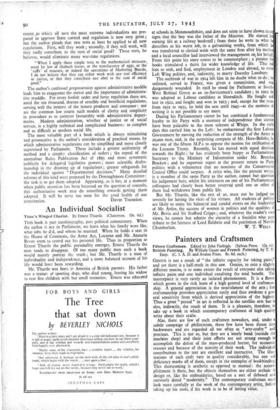An Individual Socialist
Time's Winged Chariot. By Ernest Thurtle. (Chaterson. 10s. 6d.) Tins book is part autobiography, part political commentary. When the author is not in Parliament, we learn what his family were like, what jobs he did, and whom he married. When he holds a seat in the House of Commons, the Army Act, Locarno and Mr. Aneurin Bevan seem to crowd out his personal life. Thus in proportion as Ernest Thurtle the public personality emerges, Ernest Thurtle the man tends to disappear. Of too many public men such a book would merely portray the truth ; but Mr. Thurtle is a man of individuality and independence, and a more balanced account of his life would have been rewarding.
Mr. Thurtle was born it America of British parents. His father was a trainer of sporting dogs, who died young, leaving his widow to rear five children with but small resources. Ernest was educated
at schools in Monmouthshire, and does not seem to have shown man signs that the boy was the father of the Minister. He started hit. earning life at a railway bookstall ; from there he went to what ht describes as his worst job, in a galvanising works, from which he was transferred to clerical work with the same firm after his mother and a local councillor had interviewed the management on his behalf. From this point his story ceases to be commonplace ; a passion for books stimulated a thirst for wider knowledge of life. This led him to seek, and find, employment in London and abroad, to enter Left Wing politics, and, indirectly, to marry Dorothy Lansbury.
The outbreak of war in 1914 left him in no doubt what to do ; he enlisted, served in France, was given a commission, and was dangerously wounded. In 1918 he stood for Parliament at South- West Bethnal Green as an ex-Servicemen's candidate ; in 1919 he was adopted as Labour candidate at Shoreditch. He fought and lost in 1922, and fought and won in 1923 ; and, except for the years from 1931 to 1935, he held the seat until 1945—at the moment of writing it is not possible to say more.
During his Parliamentary career he has combined a fundamental loyalty to his Party with a measure of independence that cannot have been palatable to the most tolerant of Whips. In the early days this carried him to the Left: he embarrassed the first Labour Government by moving the reduction of the strength of the Army to 20,000 men, and, in the surprising company of Mr. Hore-Belisha, he was one of the fifteen M.P.s to oppose the motion for ratification of the Locarno Treaty. Recently, he has moved with equal decision towards the Right ; he has evidently been happy as Parliamentary Secretary to the Ministry of Information under Mr. Brendan Bracken ; and he expresses regret at the present return to Party politics with a vehemence that no nominee of the Conservative Central Office could surpass. A critic who, like the present writer, is a member of the same Party as the author, cannot but question his judgement here, whilst his strictures on one of his Parliamentary colleagues had clearly been better reserved until one or other of them had withdrawn from public life.
But Mr. Thurtle, like the rest of us, must not be judged too severely for having the vices of his virtues. All students of politics are likely to enjoy his balanced and candid essays on the leadership of Mr. Attlee, the success of women in politics and the qualities of Mr. Sevin and Sir Stafford Cripps ; and, whatever the reader's own views, he cannot but admire the sincerity of a Socialist who pays tribute to the fairness of Lord Baldwin and the patriotism of Neville


























 Previous page
Previous page